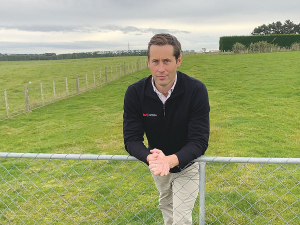Green no more?
OPINION: Your old mate has long dismissed the Greens as wooden bicycle enthusiasts with their heads in the clouds, but it looks like the ‘new Greens’ may actually be hard-nosed pragmatists when it comes to following voters.
 Westpac NZ Head of Agribusiness Tim Henshaw says the report provides farmers with impartial information about the way they can respond to climate change.
Westpac NZ Head of Agribusiness Tim Henshaw says the report provides farmers with impartial information about the way they can respond to climate change.
A new report on climate change has found that agile farm management will be critical in reducing emissions and adapting to climate change.
Authored by Lincoln University’s Agribusiness and Economics Research Unit on behalf of Westpac, The Westpac NZ Agribusiness Climate Change Report –released last week – assesses the risks and opportunities presented by climate change, as well as the sector’s vulnerabilities and potential responses. It was produced as part of a wider body of work undertaken by Lincoln University for Westpac NZ looking at the impact of climate change on agriculture in New Zealand.
Westpac NZ Head of Agribusiness Tim Henshaw told Rural News the report and a series of factsheets were designed to provide Westpac customers, and the market in general, with impartial information about the way climate change may affect their location and type of production, and how they can respond.
The report finds there is already a range of existing management options available to assist farmers in strengthening the physical resilience of their farming systems and meeting New Zealand’s 2030 agriculture climate targets, with only a few requiring an initial investment of capital.
But Henshaw points out that applying these options more widely will require uptake of best practice farm management.
“This may require a significant uplift in skills and training to ensure a greater number of farmers have sufficient expertise to both reduce emissions and adapt to climate change.”
Henshaw says the report makes information relevant to farmers and growers by exploring credible case studies.
“For example, it looks at the effect of drought on a dairy farmer in Canterbury, and the impact of warming winters on kiwifruit growers in the Bay of Plenty.”
He says the optimal response to climate change will be different for every producer.
“There is no single off-the-shelf solution. I’d encourage primary producers to think about how the climate is changing in their part of the country, and what effect that will have on production. They also need to consider what expertise they have available to adapt their operations, and plan to fill that gap if it exists.”
Henshaw says the report also explores the opportunities that may arise for producers that adapt quickly.
“Other commercial opportunities may arise if individual producers or the wider New Zealand industry take a leadership position on tackling transition risks like changing consumer preferences and trade challenges,” he adds.
“In another finding, the report also assesses the way de-stocking combined with improved productivity can help to both reduce emissions and maintain profitability.”
Lead author of the report, Lincoln University Professor Anita Wreford, says adaptation will be crucial, but has its limitations.
“There are very useful actions farmers should consider in the short and medium terms.
She says there is scope for further research into the enduring effectiveness of adaptation practices under a changing climate.
“Because astute land management will be critical in responding to climate change, there is also a need to increase training of rural professionals to support farmers and growers.”
Green Loans
Henshaw says Westpac can play a key role as a lender in helping farmers and growers prepare for a warmer future.
Earlier this year, the bank launched a pilot of its new Sustainable Agribusiness Loans with a small group of farming customers.
Henshaw says the pilot has been trialled with three farmers and Westpac plans to make the loan available to its agri customers in 2023.
“The loan is the first of its kind to require a customer to meet all parts of the Sustainable Agriculture Finance Initiative guidance,” he told Rural News.
“This guidance includes practices to reduce emissions, improve long-term resilience and deliver more sustainable outcomes in terms of water, waste, pollution and ecosystems.”
Agrisea NZ has appointed Craig Hudson as it's new chief growth officer.
State farmer Landcorp, trading as Pamu, is a forecasting a full-year net profit of around $100 million.
Tony Aitken, chief executive of Ruralco, has been awarded the Excellence in Business Leadership Award at the ANZ Business of the Year Awards.
Global trade has been thrown into another bout of uncertainty following the overnight ruling by US Supreme Court, striking down President Donald Trump's decision to impose additional tariffs on trading partners.
Controls on the movement of fruit and vegetables in the Auckland suburb of Mt Roskill have been lifted.
Fonterra farmer shareholders and unit holders are in line for another payment in April.

OPINION: Here w go: the election date is set for November 7 and the politicians are out of the gate…
OPINION: ECan data was released a few days ago showing Canterbury farmers have made “giant strides on environmental performance”.